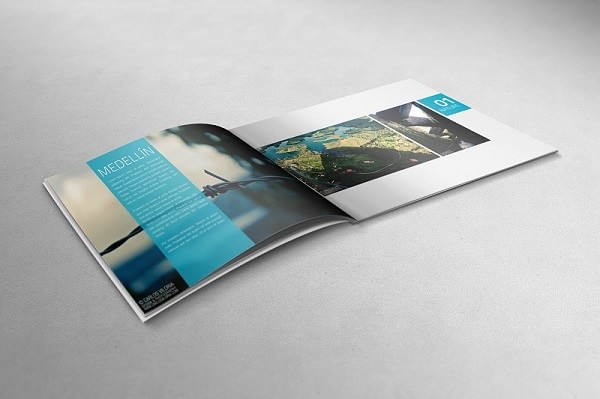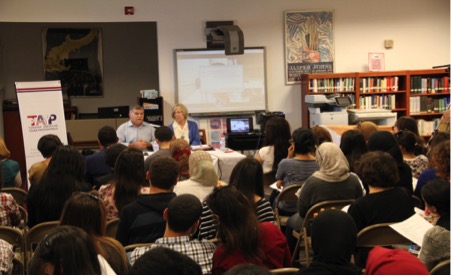The Doctoral Day: An Opportunity to Empower Tunisian Researchers

In November 10, 2015, The Tunisian American Young Professionals organization (TAYP), the Information Resource Center (IRC) and the Tunisian Association of Young Researchers (TAYR) together organized their first Doctoral Day on October 28, 2015 at the IRC at the US Embassy of Tunis. The Doctoral Day was the first session of a series of doctoral days that will be tackling different issues in relation to research.
TAYP adopted the Doctoral Day initiative as part of its 4 E’s program under the umbrella of education. The idea of the Doctoral Day is to empower researchers in Tunisia starting from people interested in a PhD program to PhD students and scholars (holders of a doctoral degree) in the hope to boost research in Tunisia and to create a network of researchers from Tunisia and the USA. The event is also open to all disciplines to promote interdisciplinary interaction and the partnership between TAYP, the IRC and TAYR will further enrich the experience.
The Doctoral Day on October 28 hosted around 100 guests from Master’s Students to scholars specialized in the fields of literature, cultural studies, linguistics and business. Guest speakers were Dr. Lynn Hannachi, Dr. Hafedh Hlila, and via skype Dr. Wael Aguir, who talked about “Guidelines on Writing Research Proposals in Cultural Studies, Linguistics and Business/Management.” The three guest speakers highlighted the importance of a good research proposal and gave different tips on how to effectively plan the research project.
Dr. Lynn Hannachi, professor of Media Studies and American Literature at the University of Carthage, talked about research in Cultural Studies and stressed the need of two criteria in choosing a topic: she warned against choosing a topic that is too easy or narrowed down since the doctoral project requires a lengthy in-depth study of the topic. Second, she warned against studying an event that is still happening in the present. The latter is a challenge because of the lack of material and because the outcome/impact of the event is not clear and may undergo ongoing change. Dr. Hannachi also highlighted how a doctoral project requires examining a specific topic from as many perspectives as possible and pointed out the necessity to reorganize the sub-parts of the doctoral project according to the findings and the progress of research. She also stressed the importance of accurate language and talked about common mistakes in using wrong words/expressions in English by non-native speakers and how that may affect the quality of a doctoral dissertation.
Dr. Hafedh Hlila, a professor of Linguistics at the University of Carthage, talked about writing research proposals for a Master’s degree in Linguistics and compared the doctoral requirements and Master’s requirements. He stressed the need to contribute to linguistics research in Tunisia through exploring uncovered linguistics studies suggesting, as an example, applying linguistics theories used to study the English language to the Tunisian dialect. He even invited researchers to explore the impact of Amazigh language in the south of Tunisia. Dr. Hlila equally highlighted the importance of time management to finish the research project in a timely manner and how to organize the research proposal in a way that gives a clear plan and clear goals to the research. The research proposal should thus tackle the three questions: what, how and why.
Accounting Professor, Dr. Wael Aguir from the University of Texas San Antonio, gave his speech via skype and stressed how research proposals are key either for university requirements or research grants. He mentioned that research has to follow certain guidelines: to be novel, interesting, replicable and defendable. An example of a good topic according to him may be about cultural aspects that affect corporate governance. He explained that the doctoral project should add value to the existing literature, and offer a new perspective and/or a different research aspect. On the other hand, replicable research meant that somebody with the same data can find the same research and the hypothesis should demonstrate a followed methodology.
The research proposal should cover three elements: the first element is the compelling story (research questions that emerge from real business stories, a theme that’s not approached from a certain angle or logical argumentation, or an issue that has not been solved). The second point is the difference between the research questions and objective. The objective should be a specific statement: “this research intends to do this, this and that” (no more than 3 objectives per paper). The third element is a good grasp of literature that relates to the research questions: data analysis, sensitivity checks, and implication of your research. Hence, it is crucial to adopt an incremental process of reading and writing. The researcher should read more to have a better focus of writing. Reading, writing and analysis are the major steps to effective research.
Dr. Aguir echoed Dr. Hlila on the “what-how and-why approach” and referred to Bill Kinney’s three questions. Any research proposal should contain these three paragraphs and they have to be clear and easy read: 1) what is the issue to be addressed, what is the intention, what do you want to accomplish, and what is the research question/the story?; 2) why is this important to the audience, to the reader, and as a contribution to the body of knowledge. What do we learn and why does it matter? 3) how is the question going to be addressed? Will the methodology be a questionnaire or interviews? And this is the nucleus of any research. Dr. Aguir advised to keep the research proposal as a separate document to be able to revisit it and revise it so as not to lose track. He also warns against being wordy in the research proposal since it has to be clear to the researcher and the audience. Also, a grant board committee from different disciplines has to be able to understand it and it has to be error free, accurate and punctual. Dr; Aguir also invited researchers to use technology to learn more about research from: Todo/ SSRN/ Research Gate/ Research Highlights and use Faff (2015 table 3 p 37) which is a table that helps organise thoughts; and to conclude, he pointed out that work will never be perfect, so it has to have a time limit.
The Doctoral Day session lasted 2 hours from 2 pm to 4 pm and invited questions from the audience at the end. The IRC representatives also offered books for the guests and announced the IRC to be a welcoming research space with books and online databases available to students and scholars. After the successful Doctoral Session hosting an enthusiastic audience of young researchers, the IRC keeps receiving high demand from people (both who attended the event and who couldn’t) for more events like this one. TAYR suggests decentralizing the event from the capital and reaching out to different regions of Tunisia. TAYP, TAYR and the IRC are eager to further put efforts together and organize more doctoral days in the future, tackling different topics of note.
related news




About the author
Courtney Joline